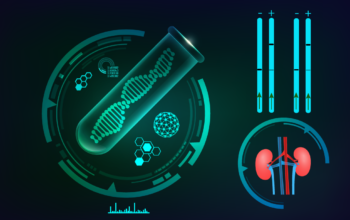
Date: 28th January 2022
Transplantation is increasingly seen as the best solution to end-stage organ failure, and patients with chronic diseases such as kidney disease die without a transplant or require dialysis for many years. The latter is a huge economic burden, the result of which often puts treatment out of reach of poorer patients. Globally one of the biggest challenges to the healthcare system is the organ supply crisis. Over 850 million people around the world live with some type of kidney disease, and recent estimates by the WHO reveal that kidneys are the most sought after organ. In 2020, >90,000 patient in the US alone were on the kidney transplant list, and only ~25% of patients received one. There are therefore ongoing efforts to find solutions for the organ shortage, and radical solutions are being explored. Now, researchers have achieved the world’s first clinical-grade transplant of gene-edited pig kidneys into a brain-dead human recipient, showing they were functional for several days and were not immediately rejected.
Xenotransplantation is any procedure that involves the transplantation, implantation or infusion into a human recipient of either (i) live cells, tissues, or organs from a nonhuman animal source, or (ii) human body fluids, cells, tissues or organs that have had ex vivo contact with live nonhuman animal cells, tissues or organs. Xenotransplantation could address the worldwide organ shortage crisis, and the domestic pig is a promising organ source for humans, as organs are similar in size and have physiologic similarities. However, immune rejection would limit this approach so to overcome this challenge researchers are looking into genetically modifying organs from engineered pigs to reduce immune invasion.
Now, a team of researchers at University of Alabama at Birmingham (UAB), US, led by Jayme Locke have demonstrated for the first time that porcine genetically modified kidneys transplanted into the body of a brain-dead human recipient are suitable for direct clinical-grade therapeutic use in humans.
Genetically modified pig kidneys have been extensively tested in non-human primates however, up until recently they had yet to be trialled in humans. In preparation for a clinical trial of xenotransplantation, the team developed an in vivo pre-clinical human model to test the safety and feasibility principles that have already been established in animal models. The recipient, Jim Parsons, was a registered organ donor whose organs unfortunately weren’t suitable for donation. Mr. Parsons and his family, in an amazing act of generosity, gifted the team permission to replicate precisely how they would perform this transplant in a living human, which the team have now proposed to named ‘The Parsons Model’.
The genetically modified pig kidneys, contained 10 key gene edits aimed to make the kidneys suitable for transplant into humans. Dubbed UKidney™, the organs were developed by Revivicor, Inc., a regenerative medicine company based in Blacksburg, US.
The pigs contained targeted insertion of 2 human complement inhibitor genes (hDAF, hCD46), 2 human anticoagulant genes (hTBM, hEPCR), and 2 immunomodulatory genes (hCD47, hHO1), as well as deletion of 3 pig carbohydrate antigens and the pig growth hormone receptor gene. Importantly, the pigs did not express red blood cell antigens and are therefore universal donors with respect to blood type.
The kidneys were removed from the donor animal, and transported as a human kidney would be to the hospital. Before surgery, the brain-dead recipient and donor animal underwent a crossmatch compatibility test to determine whether the genetically modified pig kidney and its intended recipient were a good tissue match – the test was developed at UAB and was the first time it was used cross species.
The recipients kidneys were removed and replaced with the pig kidneys in the exact anatomic locations used for human donor kidneys. They had the same attachments to the renal artery, renal vein and the ureter that carries urine from the kidney to the bladder. The recipient received standard immune-suppression therapy used in human-to-human kidney allotransplantation.
During reperfusion Parsons remained hemodynamically stable and vascular integrity was observed under human blood pressure. Importantly, no hyperacute rejection was observed, and the kidneys which were able to filter blood and produced variable amounts of urine remained viable until termination at the end of the trial 77 hours post transplantation. No chimerism or transmission of porcine retroviruses were detected, and biopsies revealed no evidence of cellular rejection or deposition of antibody or complement proteins. It was noted that creatinine clearance did not recover and that the kidneys developed tiny blot cots called fibrin thrombi, but this might be due to the the patient’s complicated condition after brain death.
Conclusions and future applications
In conclusion, the team have demonstrated that major barriers to human xenotransplantation have been surmounted, identified where new knowledge is needed to optimise xenotransplantation outcomes in humans, and have laid the foundation for the establishment of a novel preclinical human model for further study.
In Locke’s words “This game-changing moment in the history of medicine represents a paradigm shift and a major milestone in the field of xenotransplantation, which is arguably the best solution to the organ shortage crisis.”
This will be seen in the field as a major advancement to treating end-stage kidney disease. Indeed, the insights gained here, and the affirmation of the novel preclinical decedent model, will propel xenotransplants into becoming a reality in the near future. In fact, just last week we reported that Revivicor’s genetically engineered UHeartTM had been successfully transplanted into a living patient, and the patient has now reached a two-week milestone post-transplant.
Locke’s team now believe they have bridged the critical knowledge gaps, and have obtained the safety and feasibility data to begin clinical trial in living patients which they will now be following up.
For more information please see the press release at UAB
Porrett, P.M., Orandi, B.J., Kumar, V., Houp, J., Anderson, D., Cozette Killian, A., Hauptfeld-Dolejsek, V., Martin, Dominque E., Macedon, S., Budd, N., et al. First clinical-grade porcine kidney xenotransplant using a human decedent model. American Journal of Transplantation.
https://doi.org/10.1111/ajt.16930


